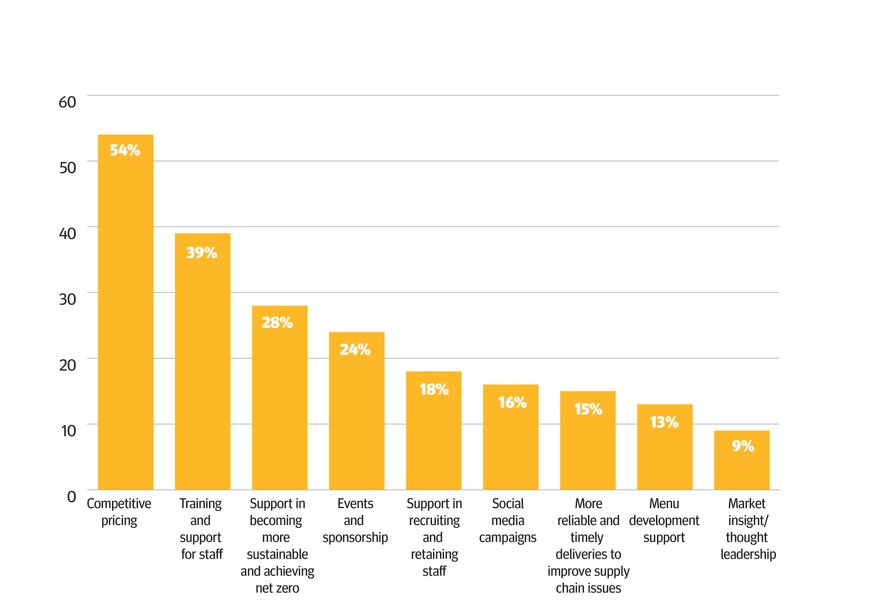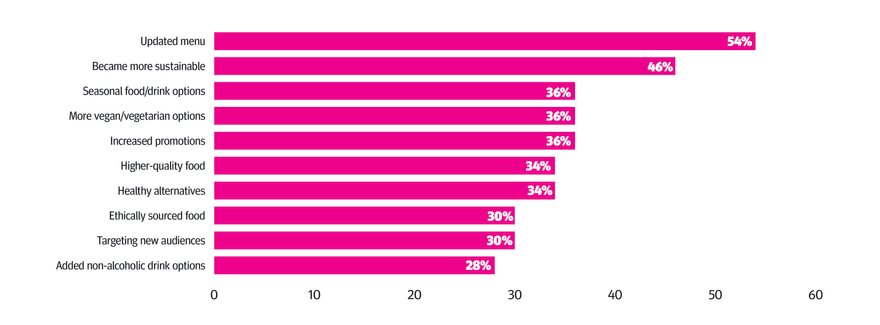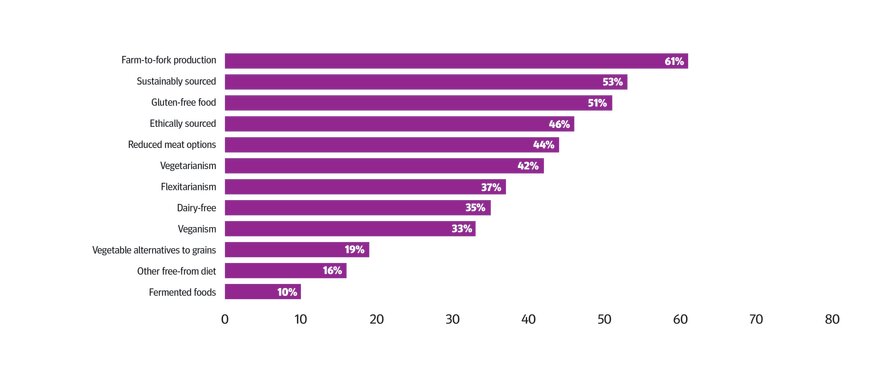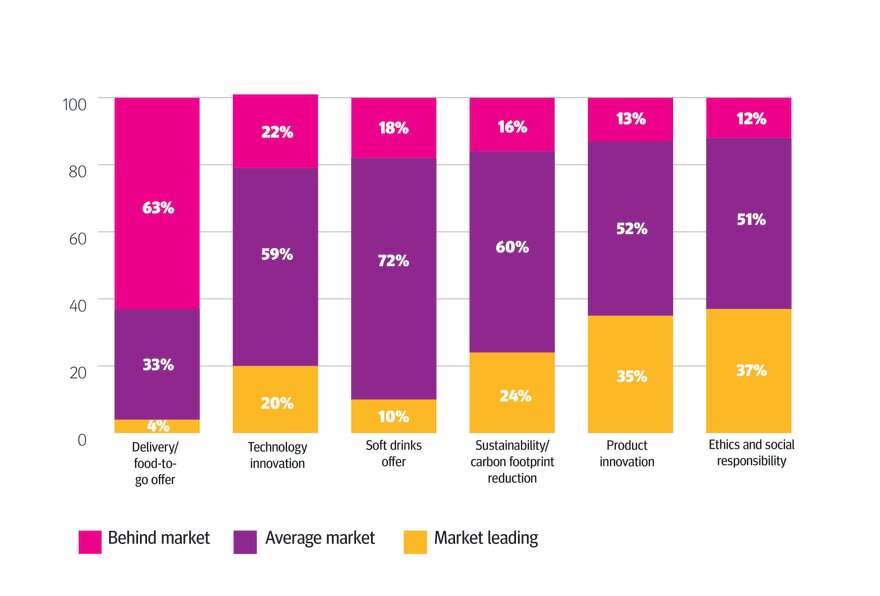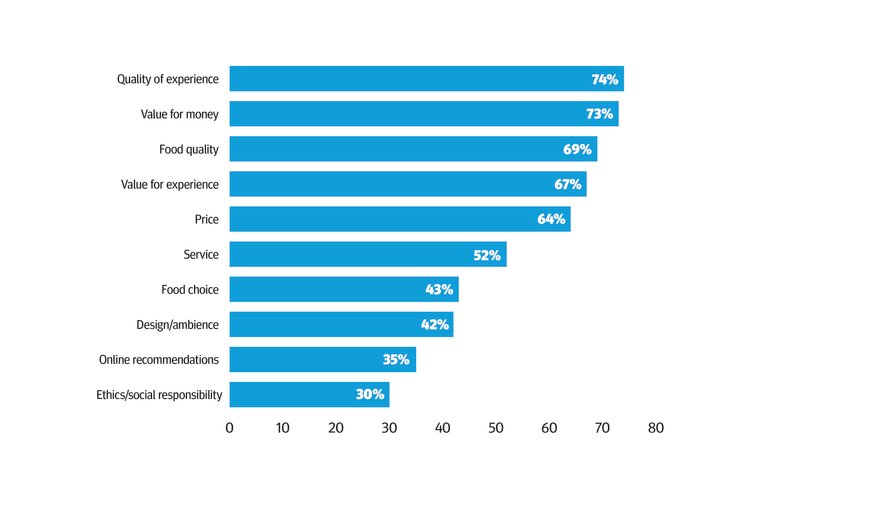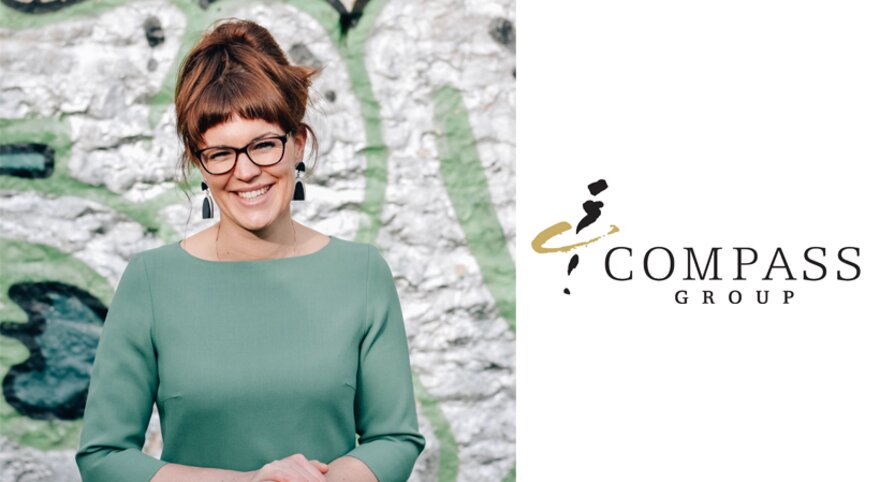There are many ways to make a sustainable business, but how can operators make sure they're making the right choices? Emma Lake looks at how business leaders are doing good for the environment
When it comes to sustainability the industry has come a long way since it began removing plastic straws and stirrers from bars, restaurants and hotels en masse in the mid-2010s.
Hospitality operators have not just made strides in finding innovative solutions to cut waste and reduce energy use, but they have also examined all areas of their businesses, from relationships with local communities to the opportunities offered to teams.
The Hospitality Business Leader Survey 2023, produced by The Caterer and CGA by NIQ, found that 46% of operators felt their businesses had become more sustainable in the past 12 months. Some 60% of respondents felt they were in line with the market when it comes to sustainability and reducing their carbon footprint, 24% felt they were market leading and 16% felt they were behind the market.
Similarly, 51% of leaders thought they were in line with the market when it comes to ethics and social responsibility, 37% ahead of the market and 12% behind the market. However social responsibility was thought to be the least important consideration for consumers choosing where to eat, behind other factors such as quality of experience, value for money, food, service and online recommendations.
Accreditation station
There is no one definition of what a sustainable business looks like, but many operators have looked to B Corp accreditation as a way of measuring their progress and driving positive change across all areas. Among the businesses to have been awarded the accreditation are caterer Lettice Events, casual dining brand Pizza Pilgrims and hotel group Inhabit Hotels.
Thom Elliot, co-founder of Pizza Pilgrims, says: "We've always wanted to be a company that does the right thing, particularly around our team. It became evident to me that I didn't know what good looked like globally and finding a business to be our torch bearer through the darkness of being a company that is about more than just profit excited me."
B Corp companies commit to using business as a force for good to benefit all people, communities and the planet through a continuous improvement process.
To gain the certification, businesses undergo rigorous analysis under five headings: governance, workers, customers, communities and the environment, from which a score is formulated.
Elliot adds: "The B Corp score is going to become like a KPI for us. You need to score 80 and we got 81.7, which tells me there's plenty of room for improvement. It tells you where you need to look and how we can be most effective in being a force for good."
Achieving B Corp certification was a multi-year project that involved every department of Pizza Pilgrims and saw the business employ a consultant to help it understand the challenges. The changes made were not just in shoring up environmental practises but involved adapting the governance structure of the business and the articles of the company, introducing a pledge to be accountable to all stakeholders, not just shareholders.
This was also an area that excited Lettice Events founder Holly Congdon. She says: "I really loved the people and community aspect, it's such an important pillar. I think a lot of people don't realise the importance of it, but those stakeholders are the people running the business every day and they're able to affect big changes. It gave us a framework to understand what we needed to look at – having consistent meetings, bringing people on board, having more roundtable discussions – it creates opportunities."
Thinking about food and drink suppliers, how can they help your company more in 2023?
Have you already made any enhancements or changes to your offer in the past 12 months?
Keep on moving
As it continues its journey Pizza Pilgrims has been driving a number of initiatives, such as developing doors for its pizza ovens that will allow heat to be better retained overnight, exploring the use of electric cooking methods and ensuring a focus is kept on its teams and their development, as well as organising events to share information with the wider hospitality sector.
Vera Bruntink, sustainability manager at Inhabit Hotels, agrees that gaining certification is by no means the end of the journey. She says: "Discovering the gaps in our approach to sustainability was a very valuable part of the certification process, and we made several improvements to bridge those gaps to reach a certifiable score, as well as to create plans for further improvement in the future. Once our first hotel, Inhabit on Southwick Street in London, was certified in January 2023 we were able to bring our second hotel, Inhabit in Queens Gardens, under that certification too, by implementing the same policies and practises. We are now using the assessment as a source for best practice and to inform our improvement plan, so that when we recertify in about two years, we can increase our score further."
Bruntink explains that to embed sustainable practises throughout the business, every team member needs to be in the mindset of tackling challenges with environmental and social impact at the forefront of their decisions. As such, the business has a written code of ethics, which is communicated to employees on induction, and includes social and environmental factors in hiring, training and performance reviews.
Some of the practises the business has introduced include using material recovered in the demolition phase of redevelopments to create features such as reception desks and fireplaces; working with local suppliers; recycling everything possible, with any remaining waste sent for energy recovery; and applying the principles of a circular economy (reduce, reuse, recycle) across the business. The hotel group has also partnered with a number of initiatives to benefit its teams, guests and local communities. These include mental wellbeing service Self Space, hospitality training programme Saira Hospitality, Luminary Bakery, Women in Travel, the Women Returners Programme and Building Tomorrow.
Partners and supply chains are a crucial and challenging factor for hospitality businesses looking to improve their sustainability credentials and 28% of business leaders responding to the Business Leaders' Survey said their suppliers could help them by providing support in achieving net zero.
Congdon says: "Addressing the supply chain was very important. We're working with local suppliers and have gone through that in detail, so 90% of our business expenditure is spent in a 13-mile radius, so we're benefitting local businesses by working with them."
Congdon also stresses the benefits of achieving B Corp accreditation, not just in cementing the business' vision, but in inspiring clients and employees: "This was a huge investment for us, especially coming out of Covid, but we wanted to set store by the values we set ourselves and we had to put our money where our mouth was," she explains. "We're very small but exploring doing everything we can do is very interesting. For the younger generation working somewhere where you feel you have an ability to make change and have a positive impact is really important. Being a business with B Corp certification has helped us recruit by word of mouth and contributed to amazing staff retention."
Which dietary, ingredient and production trends do you think will continue to or emerge as key trends this year?
How do you rate your business in comparison with the market across these key areas?
The Zero Carbon Forum has set out ambitions for the brewing and hospitality sector to eliminate operational emissions by 2030 and achieve net zero across supply chains by 2040. Chief executive Mark Chapman stresses the importance of businesses understanding their carbon impact.
He explains: "We measure the emissions of forum members across all scopes every year. We also launched a carbon calculator that has been used by more than 500 organisations to measure their footprint and we're working with companies like Greene King to promote it to their pub partners. It's becoming more mainstream [to measure carbon outlay] and we talk about measure, plan, reduce. You can't say anything credibly about sustainability until you've measured your impact to work out what you can do.
"The surprising thing operators have found is that energy is on average around 10% [of their footprint]. People think it's a much bigger part, but [despite that] it's still a great place to start because it can save you a lot of money. Waste can again only be a few per cent, but it's important to take action because it's very demonstrable to your customers. I think it surprises people how big a part of their footprint food is, and particularly how big meat and dairy are as part of that."
Despite the size of the challenge Chapman believes the industry can reach the targets set to achieve net zero. He adds: "The industry has made good progress on scopes one and two [direct emissions and indirect emissions from energy purchased] around net zero. We've achieved significant emissions reductions, particularly on energy, with operators shifting to buying renewable and implementing efficiency measures.
"There's more that needs to be done on scope three [indirect emissions from supply chains]. We have to work with our supply chains to take the action for them to reach net zero as well as looking at what changes we can make through menu adaptations and dietary change to support that.
Which of the following do you see as key drivers for consumers in choosing where to eat and drink out in 2023?
"Your supply chain exists because of the products you sell, it doesn't just happen to you. You do have to take responsibility for your supply chain because it's yours and it's based on the buildings you run and the menus you operate. That said, they are separate companies that you have to engage and influence."
When asked what dietary, ingredient and product trends would continue or emerge this year, leaders responding to The Caterer's survey put forward three sustainability-linked trends (farm to fork production – 61%, sustainable sourcing – 53% and ethical sourcing – 46%) in their top four answers; showing that the wider industry recognises that scrutiny of businesses' sustainability credentials is only going to become more exacting in the years ahead.
Colin Butler, Unilever Food Solutions UKI managing director
Unilever's scale brings enormous responsibility when it comes to acting sustainably, so we are leading the charge in the UK's foodservice sector. We recognise the critical importance of fostering environmentally conscious practices within the industry and acknowledge the growing consumer awareness and urgent need for action highlighted in the Business Leaders Survey. We are striving to bridge the gap between awareness and action by empowering operators with the tools, knowledge and support needed to integrate sustainable practices seamlessly into their operations.
With wasted food costing the UK hospitality sector £3.2b a year, the issue extends beyond financial loss and highlights a broader need for more sustainable kitchen practices. Every culinary decision holds the potential to foster a more sustainable future and accelerate growth for your business, from ingredient selection to portion management. By choosing ingredients that work in multiple ways across various dishes, and ensuring portions are balanced, operators can reduce waste both in the kitchen and the dining room.
Our commitment to addressing food waste has led to partnerships with organisations like WRAP and initiatives such as Guardians of Grub, where we provide operators with practical solutions to reduce food waste in their kitchens. Our upcoming Future Menus report also provides techniques for low-waste menus, challenging tradition and urging chefs to rethink how they use ingredients – whether that's turning offcuts into purées or scraps into garnishes. We aim to empower chefs across the industry to rethink their approach to food preparation and embrace innovative ways to minimise environmental impact while driving profitability.
Beyond waste reduction, Unilever is committed to supporting operators with our wider sustainability goals, such as reducing plastics in packaging and promoting plant-based options. By 2025, we aim for at least 25% recycled plastic and seek to double the sale of products delivering positive nutrition. We invest in operational sustainability, transitioning towards renewable energy and sustainable ingredient sourcing, aligning with our goal to halve our product footprint by 2030.
As we look ahead, it's imperative for operators to prioritise sustainability, not only as a moral obligation but also as a strategic imperative for long-term success as consumers continue to consider the environmental impacts of their eating out choices. By embracing sustainable practices, businesses can not only protect their profits but also contribute to a more resilient and environmentally conscious foodservice industry. Together, with collaborative efforts and shared commitment, we can pave the way towards a more sustainable future for all.
Carolyn Ball, director for delivery of net zero –Compass Group UK & Ireland
The impacts of climate change will see the world undergo one of the biggest economic transformations in living memory and a business's ability to manage the risks and seize the opportunities presented through this transformation will determine its growth. We know that developing this ability requires a transition plan, and that the effectiveness of that plan depends on how well it can inform and support the business's wider strategy by engaging business functions across multiple different disciplines.
Understanding that a sustainability team too removed from operational delivery cannot be effective, we're proud to highlight standout contributions from individuals right across the organisation as a key part of the transition plan we published at the end of last month. Within it, we acknowledge the inevitable ups and downs of work undertaken in pursuit of lasting change, and how we've drawn on the resources available to us, the current technologies and the standards that exist now.
This means we don't get everything right, accept there are unknowns yet to be tackled and we continue to learn many lessons from leaning into barriers encountered together.
Throughout the plan, we share specific examples of what we've done to date, what we're doing now and what we're prioritising next, since the business made the necessarily ambitious commitment to reach climate net zero by 2030.
An absolute reduction in emissions of -9.4% across Scope 1,2,3 (FY19 baseline – FY23) inclusive of 20% business growth is reported. We also provide context, to underline both the impact and challenges experienced by our 50,000-strong team, serving 214 million meals a year across 4,000 locations; scale which helps to explain why emissions associated to purchases of food and drink are so material – representing 62.5% of our FY23 footprint.
As we all continue to learn through doing, we have strengthened existing partnerships and formed new ones. And by investing in specialist expertise, we can add value to our clients, colleagues, suppliers and peers, enabling greater transparency and decision-useful reporting for us all.
The creation and analysis of low-carbon, nutritionally complete recipes that celebrate our chefs' ability to design seasonal, plant-based and low-waste menus is one example.
In FY23, 21,345 recipes were centrally analysed through our partnership with sustainability tech company and carbon impact specialists Foodsteps. This level of insight evidences why having depth and diversity in our knowledge base is such an asset and why growing it further remains a priority – helping to increase Compass's focus on the wider societal and economic contribution the business can make, and on the opportunities that come from doing so.
Tim Rumney, chief executive, BWH Hotels GB
It's no secret that more and more people are becoming eco-conscious. While The Caterer's research findings state social responsibility was seen as the lowest consideration for consumers when choosing where to eat and drink, we've found that when choosing a place to stay, sustainability is an ever-growing and important decision-making factor.
In 2023, nearly two-thirds (61%) of UK consumers felt sustainability was more important to them than it was two years before, a trend we feel will only continue to grow. People are now actively searching for eco-friendly hotels. From a corporate travel perspective, we are seeing requests for proposals that will only include hotels with proven sustainable credentials. This reflects a growing awareness of environmental responsibility but also underscores the importance of aligning business practices with ethical values. Put bluntly, from an operator's perspective, taking steps towards sustainability is no longer a decision based purely on morals – it is also a commercially necessary one.
At BWH Hotels GB we are working hard alongside our independent hotels to minimise our collective environmental impact, reduce operational costs, appeal to eco-conscious guests and contribute positively to local communities. But it's fair to say that many operators need to make some fast strides in this area to meet consumer expectations.
The Caterer's research states only 37% of operators think they're ahead of the market in terms of ‘ethics and social responsibility' – which shows the level of support required for some to reach our 2040 net zero target. This is why we've partnered with Quality in Tourism for the REST Accreditation – Responsible Ethical Sustainable Tourism. The REST scheme evaluates more than just environmental sustainability, it measures relationships with clients and hotel workforces, it examines corporate social responsibility practices, HR directives and supplier connections. It is an evidence-based and evolving process for hotels to embrace and deliver on their promises to the environment, not simply a ‘one-time, tick-box exercise'.
We are not only working with QIT for REST, but we are also working closely with the Zero Carbon Forum to ensure we are working towards our carbon footprint goals across our membership of 240-plus hotels too.
Working with this set of experts we have set our ambition for all GB hotels to achieve an accreditation by December 2024, to identify our current carbon footprint and set achievable future goals. It is so important for us that while our hotels are independent, we have a united brand message on sustainability.
By prioritising sustainability, hotels can not only reduce their environmental footprint but also attract socially aware guests, differentiate themselves in a competitive market, and secure long-term economic success in an increasingly eco-conscious world.
In association with
Continue reading
You need to be a premium member to view this. Subscribe from just 99p per week.
Already subscribed? Log In


